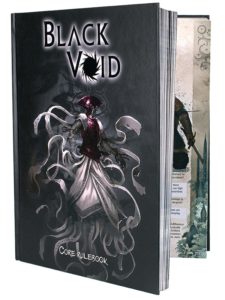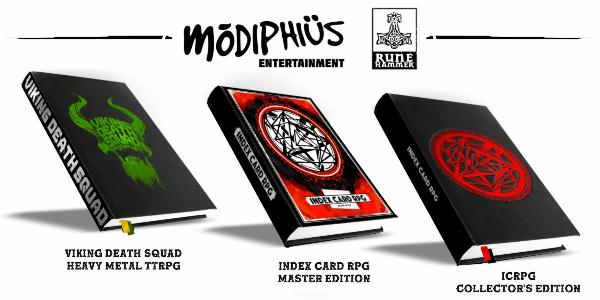
Black Void
Black Void is a dark fantasy role-playing game written by Christoffer S. Sevaldsen, published by Black Void Games, and distributed by Modiphius Entertainment.
By Aaron T. Huss

Learn more about Black Void here
Purchase Black Void here (paid link)
Find other Black Void posts here
Black Void is a unique dark fantasy setting powered by an original d12 system. It takes a couple twists on the fantasy genre by taking humans out of their comfort zone in history and throwing them into a completely alien place where they dwell within the alleyways or succumb to the dangers of the galaxy. It sounds a bit sci-fi, but it’s not. To make it even more interesting, all characters are humans, or some form of demi-human, and you have to deal with the ramifications of being a human in a land that clearly doesn’t like your existence.
Black Void is another Modiphius big RPG book containing the game’s core mechanics, GM setting guidance (with a lot of setting information), and a bestiary. It weighs in at 419 pages and ultimately could be the only book you ever need to play this game over and over again. Of course there’s more out there for GMs, but unlike some games like Pathfinder and D&D, it is completely self-contained and does not require any other core supplements to be played.
If I could present an award for Best New Setting of 2019, Black Void would take home the gold. I am slightly biased, but as a prominent fan of dark fantasy, and other horror-influenced setting, I love the approach taken by this RPG… in multiple aspects.
First let’s look at where it begins.
Black Void starts in Mesopotamia. A cataclysmic event rips open a hole in the cosmos and tears a number of humans away from the Fertile Crescent and throws them across the universe to a completely alien location. Don’t think this RPG has anything to do with history, folklore, or mythology though. It is simply establishing the mindset of humanity over 4,000 years ago. The setting, however, takes place decades afterward where you are now one of the descendants of those Earthling survivors, struggling to find your place in an alien landscape (although it’s really a dark fantasy landscape and not a sci-fi alien one). It’s a very interesting place to set the timeline of the game as opposed to so many medieval- or Renaissance-influenced settings. If you know about history, the story takes place during the Bronze Age; the technology is no further advanced than the beginning of Ancient Greece.
You are a human, but you are not the “flexible, can do virtually anything good or bad” human often found as a trope in fantasy games (although humankind did manage to adapt quickly to survive in this foreign land). You are a street rat; a throwaway. Maybe you were tainted by the esoteric forces of this galaxy, transforming you into something human-like (a demi-human, but don’t think elves or anything like that). No matter how you look at it, you’re not really a hero; in fact, I don’t think there are really any heroes in this setting! You are a survivor and you will probably spend the rest of your in-game life fighting to stay alive.
Finally, there’s the overall, underlying creepiness of the setting. Elements of horror, cosmic horror even, and nasty things out in the wilderness that want to turn you into lunch. Then there is the city (it seems more like a city-state to me) filled with potential for conflicts and maybe political intrigue.
Yeah! The setting is all dark fantasy and something quite different than what commonly passes for dark fantasy.
Then there’s the mechanics… let’s talk about that next.
The presentation of the mechanics made me laugh. They literally try to sell themselves as simple. In fact, here’s the quote from the book:
The primary maxim behind the rules is “simplicity grants diversity”, meaning that the entire system is based on a few basic principles making the rules easy to grasp…
What made me laugh is that the only simplicity of the system is that you roll a d12, add your modifiers, and compare it to a target number. But then, you can boil down 75% of the RPGs out there to this basic principle. Of course, it doesn’t really capture the depth of the system.
To me, the game mechanics powering Black Void are a bit complicated. The reason I say this is due to a lack of internal consistency. First, characters are comprised of Traits, much like a d20 system. Each Trait is a score that translates to a modifier, again much like a d20 system. Traits and their modifiers do not start at the same value, but they are both linear. Then you have Talents; Talents are like feats that bolster your character, but you can only take Talents that pertain to a Trait with a score of at least 3. That means you cannot mix and match; you bolster your strengths only. Then you have Flaws; Flaws are like hindrances, but you can only take Flaws that pertain to a Trait with a score of 3 or less. This means your weaknesses can truly hold you back. Again, no mixing and matching.
Next you add a Background which represents your past and can affect your character concept. Being that they cost points to take, you’ll likely have to plot your character before actually creating it. If you are a demi-human, you can have Attributes. Attributes are like special traits that mark you as not-entirely-human. Sometimes they are like feats, sometimes they are like hindrances. If you are human, but not a pureblood human, you can also take Esoteric Attributes; these are like supernatural aspects that bend the rules. From here there is a magic system with lots of tables to consult when you want to use a Power. So many tables…
Then you pick Skills. Oddly enough Skills are given a score that translates to a modifier, but the modifiers are equal to the score. Skills can be used in a somewhat flexible manner, being combined with different Traits to perform different deeds. Some of the Skills are quite broad while others are incredibly specific. Such as Athletics versus Cryptography. The list is simple enough, but there are also Combat Skills with each type of weapon having a different Skill. Not very simple anymore… Then you have Specializations on your combat Skills which add even more complexity. There are then a bunch of secondary Traits like Health, Sanity, Movement, and Defence. Those are all fairly common.
Then you move on to equipment. The basic list of equipment is fairly straightforward and then you get to customization options where you can modify or enhance each individual weapon. Armor has similar modifications.
Then there’s the rules. The types of actions you can perform in-game are commonplace; nothing big there. But combat only allows you to perform a single action in a combat round. If you do more than one, you suffer a multi-action penalty. One action doesn’t really seem like enough as it covers things like readying a weapon (1 action), moving (1 action), attacking (1 action), etc. And you can perform a defensive action, but I don’t know how that would work if you’re only allowed 1 action per combat round. I may be oversimplifying it, but it seems to me like combat would take a really long time. When you go through the rules, there are tables for seemingly everything. Roll a 12, consult a table. Roll a 1, consult a table. Become injured, consult a table.
Then I turned to the section that embraces the dark fantasy of the setting – Sanity & Mental Effects. I was excited to see this… until I absorbed it. Mental effects are handled by multiple sources – Awe, Delirium, Fear, and Madness. Again… not simplicity; complexity.
There are some other fiddly bits here and there, but I’m not going to get into them.
Overall, I love the setting, but I don’t particularly care for the system. I think the system has a lot of unnecessary complexity, despite trying to sell itself as simple, relies way too heavily on tables, and jumps around in implementation with mechanics that don’t always feel homogeneous.
If you enjoy playing games like Legend, RuneQuest, and Pathfinder, and enjoy dark fantasy settings, I suggest giving Black Void a try. If you really get into dark fantasy games, the setting is really cool!
If you really like dark fantasy games, but have a favored system, borrow this setting in every way possible and you will likely create something quite amazing. Just so you know, there is a lot of setting content here, so you will definitely get your money’s worth (well, the GM will at least).
If you’re not really into dark fantasy and prefer playing games like D&D 5E, Savage Worlds, and Fate where the rules have been reduced, you’re probably not going to get anything out of Black Void. The system is likely more complex than you prefer and the setting is possibly more horror-influenced than you enjoy.

